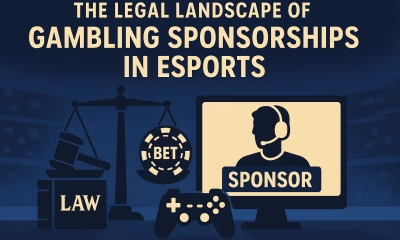Gambling
Navigating the Legal Landscape of Esports Wagering in Nevada
As Nevada emerges as a key player in the esports wagering domain, legal professionals and esports teams must understand the evolving regulatory and legal framework shaping this burgeoning industry. The state’s proactive stance in fostering a viable esports betting market, despite potential integrity risks, is a critical development following the heightened interest in competitive video gaming over the last two years.

Legal Framework and Regulatory Oversight
The establishment of the Esports Technical Advisory Committee by Nevada is a pivotal step towards crafting a robust legal structure for esports wagering. This committee, comprising eight experts, is tasked with deliberating on the nuances of regulating bets on video game competitions. For legal advisors and esports entities, understanding the committee’s directives and recommendations is crucial for compliance and strategic planning.
The Pandemic’s Impact and Legal Precedents
The COVID-19 pandemic, which led to the suspension of traditional sports, accelerated Nevada’s regulatory focus on esports. Notably, the Nevada Gaming Control Board’s authorization in March 2020 to place bets on esports events like the Counter-Strike – ESL Pro League Season 11: North America set a legal precedent. This move provides a framework for lawyers advising clients on navigating esports betting regulations.
Historical Context and Legal Advocacy
The journey to regulate esports betting in Nevada began well before the pandemic. The advocacy by former Governor Brian Sandoval in 2016 for regulatory development in this area highlights the need for ongoing legal advocacy and engagement with state gaming policy. Legal professionals representing esports interests must consider this historical context in their strategic advice and advocacy efforts.
Industry Perspectives
Grant Johnson, CEO of Esports Entertainment Group, underscores the demographic shift in esports audiences – predominantly adults with higher disposable incomes than traditional sports bettors. This demographic data is vital for legal advisors focusing on esports, impacting everything from advertising strategies to contract negotiations. Johnson’s insights also challenge the traditional ‘skins’ betting model, advocating for a collaborative approach between esports and casino operations. This perspective is crucial for legal teams structuring partnerships and agreements in the esports betting landscape.
The HyperX Esports Arena
The HyperX Esports Arena at the Luxor in Las Vegas serves as a case study in early esports venue investment. Johnson’s critique that the arena was “too far ahead of its time” without supporting infrastructure offers a cautionary tale. Legal advisors and esports teams should consider such examples when advising on or engaging in similar ventures, assessing the legal, economic, and infrastructural aspects.
Regulatory Developments: A Legal Overview
The Nevada Gaming Commission’s recent decision to equate esports betting with traditional sports betting marks a significant shift. This regulatory change, influenced by the Esports Technical Advisory Committee’s recommendations, simplifies the betting process and potentially expands the market. For lawyers, this development necessitates a thorough understanding of new regulations, particularly concerning integrity and anti-doping standards. The Commission’s nuanced stance, opting to exclude stringent doping controls, reflects the unique challenges in esports, highlighting the need for legal professionals to stay abreast of sector-specific regulatory changes.
Conclusion
As esports wagering continues to grow, Nevada’s approach offers a blueprint for other jurisdictions. For legal advisors and esports teams, staying informed about these regulatory changes is imperative. The state’s balanced approach between fostering industry growth and ensuring regulatory compliance could significantly influence the legal contours of esports betting. Understanding and navigating these legal nuances will be crucial for those operating at the intersection of esports and gaming law.
Image source: Sports Travel


















